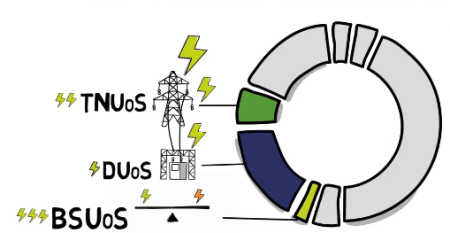
Dialogue and disruption at the Oxford Electric Vehicle Summit
Marie-Lou Picherit, R&D Co-ordinator, EDF Energy.
We were proud to sponsor the business panel and speak at the Oxford Electric Vehicle Summit this week.
We joined a wide programme of speakers from government, business, utilities, local authorities, academia, car manufacturers, the Grid and individuals for dialogue and debate on the EV transition. The two day event sought to give a 360 degree view on where the UK is at in its EV transition and how it contributes to the wider global issues of air quality, urbanisation, digitalisation, climate change and smart cities. The master dialogue of the event focused on the huge opportunities associated with the electrification of our nation, such as improved quality of life, productivity and economy, but not without a reality check on the challenges ahead. The most uplifting theme of the event though, was the desire for all players in the field to try and make EV accessible, affordable, safe and practical for the consumer through collaboration.
Oxford, as a world leader in its implementation of cleaner air through zero emissions zones, was a befitting setting for the event. This is an outstanding achievement from what used to be one of the worst cities in the country for air quality and congestion.
Oxford and the case for EV
Cllr Susan Brown from Oxford City Council highlighted the urgent need to improve air quality through electrification with some hard hitting facts. There is no safe legal limit for air pollution, it is the health crisis of the decade. Dirty air is responsible for asthma, diabetes, heart attacks, dementia, Alzheimer’s, cancer and, most worryingly, irreversible damage to the lungs and growth of young children, particularly in poorer areas which are often the most polluted and where people have the least means to replace their petrol/ diesel cars.
She added that these problems of environment, health and poverty demand smart solutions and accelerated adoption to reduce the gap, which is where investment and funding of EV play a key role.
Oxford can demonstrate some impressive examples of where the EV rollout has brought growth, productivity and innovation to the city, such as:
The £240 million Faraday battery project, which aims to make the UK a world leader in battery.
The GoUltraLow project for on street charging and pop-up charging trials
The clean bus plan has seen 5 of Oxford’s sightseeing buses go electric, as well as a further rollout planned for clean city buses and taxis.
The Defra clean air quality fund will help the city’s Covered Market go electric.
Susan accepted that there were many challenges ahead but cautioned against playing it safe- EV’s are not going to go away and neither is the increasingly urgent issue of pollution, asserting that the risk of inaction is bigger than the risks associated with accelerated adoption.
Mairi Brooks, Sustainable City Team Manager, Oxford City Council covered Oxford’s plans to roll out it’s Zero Emissions plan in phases starting in 2020. The plans will see pedal powered freight deliveries and fully electric double decker buses to zero emissions zones. So Oxford provides a great case study for proving that businesses can benefit commercially and from a CSR point of view from the EV transition.
The UK’s EV transition in a global context
Natasha Robinson from the Office for Low Emission Vehicles (OLEV) covered the international side of the UK’s work in the EV space, and in that context the UK has a lot to be proud of. The UK is part of the International Zero-Emission Vehicle (ZEV) Alliance, which aims to share knowledge and issues on worldwide scale, tackling the questions of how worldwide policy makers can manage and support the transition. Collaboration on this scale is imperative to a successful transition. OLEV was formed in 2009 and many countries would like to adopt a similar approach. New York is aiming to use our GoUltraLow campaign as a blueprint for its EV rollout. Equally, the UK can learn from front runner countries like Norway and the Netherlands who are streets ahead on their rollout. Across the board internationally, the charging infrastructure is a key issue and the UK hopes to play a key role in solving it.
From the global markets perspective offered by Colin Mckerracher, Head of Advanced Transport, Bloomberg New Energy Finance, there will be opportunities throughout the EV value chain. Individual countries are also major actors - China is pushing to create a globally competitive cluster of auto companies capable of exporting EV’s around the world. The UK must not lose out to other markets in what will be a globally competitive space.
With the price of lithium coming down and other players coming into the market, Bloomberg predicts that by 2025, a fully cost competitive price for EV could be achieved, but he added that we must be realistic and honest about what trajectory we are currently on and what we must do to get there.
Joining the dots – National and local government policy perspectives
Speakers from national and local government shared their views on where the UK is at and what have we achieved so far. The UK is currently second place in the EV market with 2% sales to date.
Steve Ives, Head of Competitions at OLEV, demonstrated the scale of government investment in the space, with increased funding for chargepoints and plugins. The government has committed to invest £48 million in the transition of buses and taxi to electric. They have also invested £7 million in resident charging spaces. There are currently 12.5k plug in chargers in the UK, 1000 rapid chargers and 9k residential chargers. This works out at approximately 1 charger per 12 cars – this isn’t bad but there’s some way to go for a truly robust system that people will trust in. The Treasury budget allocated to EV is £400 million which shows clear desire to invest in the acceleration. The Houses of Parliament have sent the Automotive and Electric Vehicle bill for royal assent. In it they propose greater access and connection to chargepoints, motorway and fuel retailer chargepoints and smarter technologies supported by the Grid and energy suppliers.
Local authorities also have a vital role to play in investing that funding and communicating local needs and issues to the government. I heard an example from one delegate at a networking session where national government were planning to move street lamps off the pavement and back against the wall for a very valid reason that it helps with pavement accessibility and lessens damage to the lamps from cars. However, on a local level authorities had identified the vital role streetlamps can play in on street charging- this kind of communication is vital. Mairi Brooks also reinforced the importance of local community research and data gathering in rolling out EV’s. She explained that they faced the issue of EV adoption in Oxford being lower than expected despite the council’s efforts to electrify the city. They found that access to off street parking was a major issue for residents. To tackle this they carried out market testing and trials, worked with partners rather than contractors, ensured that the systems were commercially viable and that the basics of great customer service and value for money were a key part of the customer experience. By doing this they are starting to shift perceptions and make their collective journey towards zero emissions for the city.
The energy supplier perspective - EDF Energy on the business panel
Dr Marie-Lou Picherit from EDF Energy’s R&D team gave an overview of our R&D projects, in particular the Oxford V2Go project where we are working with the council and consortiums to identify assets for new EV business models and revenue streams. The aim of our R&D work in the EV space is to understand the market, the barriers and the customer needs so we can tailor our services accordingly. How do we do this? Firstly we benefit from our international presence. EDF Energy is the largest supplier to B2B, many of whom manage big fleets. Our R&D centres are based in China, UK, US, France, Germany and Italy which means we can gather a wide variety of data and feedback on customer behaviour which can then influence our current and future business models.
To switch to EV’s [requires] many informed decisions, and I think our role is to be ready with the right offer and right support for our customers
Marie-Lou Picherit, R&D Co-ordinator, EDF Energy.
Rich Hughes, our Director of Sales & Marketing, closed the business panel with a reflection on EV with an energy lens. Energy is in more demand than ever. He reinforced that we must take control of our own destiny, that the tipping point is coming, it’s just a matter of when not if. And in fact, this is the exact opportunity for big business, with large fleets and car-parks, to drive the agenda and the tipping point. There are lots of players, lots of opportunities for collaboration and competition but that the transition will only work if we also transition the fuel behind it, an opinion echoed by the Grid and other speakers on the programme.
Bright, shiny new things – the car manufacturers’ perspective
It could be argued that car manufacturers get the fun job in the EV transition. They get to make the cars themselves. There was a lot of excitement and activity around the EV’s on display at the event. The classic mini cooper electric playfully bridged our vehicle heritage and future and Jaguar’s first ever pure battery EV, the I-PACE was a beautiful, sleek piece of luxury design which glided silently past me at the end of day one as I stared wistfully in its wake.
The panel of OEM’s was a veritable hall of fame, including Nissan, Hynundai, Jaguar and Porshe all sharing their stories of EV development and ambitions in this space. But they do face challenges too. They need to make the cars accessible, affordable, reliable and develop the skills both to produce and to fix the vehicles themselves. There’s also the issue of connectivity- if your car can link up to your house and your battery can power assets beyond your car, who owns the battery? How do you ensure the batteries that are in the car can be recycled as our economy shifts towards circular? The car manufacturers all agreed that the car is only part of the EV journey, that they must engage with the surrounding eco-system and help to shift the customer mindset towards EV.
Human behaviour – reaching hearts and minds
A common theme in the event was the human behaviour element which creates barriers to uptake. Our on demand culture breeds freedom. But many people see the charging element as a hindrance to their personal freedom- known as ‘range anxiety’. Martyn Briggs, Vice President of Automotive Research, Bank of America Merrill Lynch, likened public charging points to public toilets - you don’t always need them but you need to know they are there! Another speaker referred to another worry- ‘carwash anxiety’! Even I myself had the offer of an EV to Oxford but demurred due to the fear of finding a chargepoint in a city I hadn’t driven to before. My colleague, who did drive an EV to the event found that none of the 5 cards he had to charge the car were right for the particular chargepoint he visited and so paid for premium parking with a chargepoint- these are real, everyday barriers to EV that need to be overcome.
So what’s the solution? Normalisation. Increased take up, further trialling and more influence from the EV community themselves. It was commonly agreed that everyone makes friends at chargepoints because people are curious, they want to know more about the experience, they want to be reassured. As Tony Douglas, Head of Brand, Marketing & Communications for BMW said in his talk, a test drive for 20mins doesn’t work from EV’s, people need a weekend to see how they can slot seamlessly into their lives, that range anxiety can be overcome.
So, whilst there are beautifully designed, high-performance cars out there that appeal to the heart, they have to also appeal to the head- they must be accessible, affordable and with the infrastructure in place to give people trust that they are a viable. Early adopters will allow for a bit of teething trouble, the rest of us will not.
A pause for thought – the academic perspective
There were some words of caution from some speakers. Tim Schwanen, Associate Professor in Transport Studies and Director of the Transport Studies Unit, University of Oxford highlighted some issues with the EV transition which are unique to the UK, including the start/ stop nature of government funding to local authorities which creates difficulties with long-term transition. He also cited the nature of the relationship between national and local government means that many local authorities battle for space and funding, which sees some cities (London, Oxford, Milton Keynes for example) benefit and others lose out, which creates an uneven landscape of support. The next point he raised is about EV users themselves, too often understood in narrow economic terms. Instead he argued that EV’s need to be in our everyday lives and be an instrinsic part of how organisations are run. He called for a deeper understanding of how to embed EV’s, how to give people the skills to run and recharge EV’s, of overcoming resentment about vehicle data and where it’s shared, fleet management changes and non-harmonised charging. These are not insurmountable problems, and indeed can be turned into opportunities, if addressed and explored thoroughly.
Key take-outs
Exciting times are ahead and no one can fully predict the speed or the shape of what the future holds- will it be V2G or V2X (in other words everything?). But it’s clear that the momentum for EV isn’t going to slow down and that collaboration is key to overcoming the issues of infrastructure, scalability, behaviour change, affordability and practicality as we make our bold transition to a cleaner, greener and smarter country through our EV transition.
Talk to us about EV
If you’re keen to find out more about Electric Vehicles read our EV’s guide or visit our page: edfenergy.com/ev
Alternatively if you have a specific question you can contact our EV team: electricvehicles@edfenergy.com


